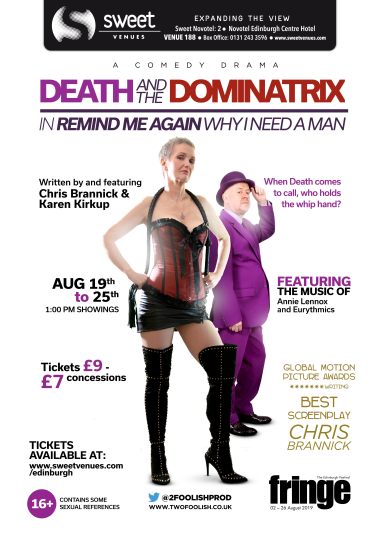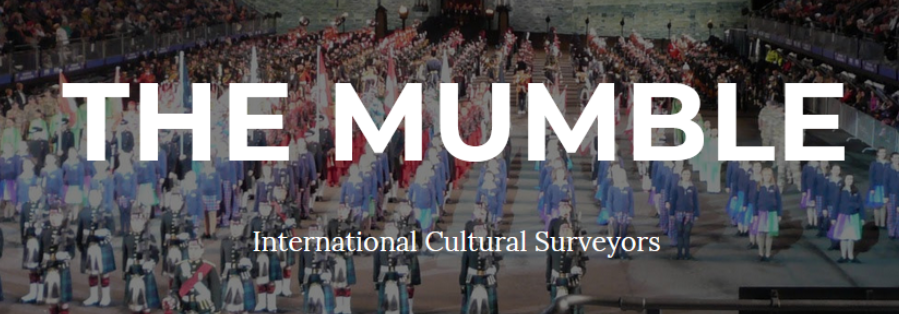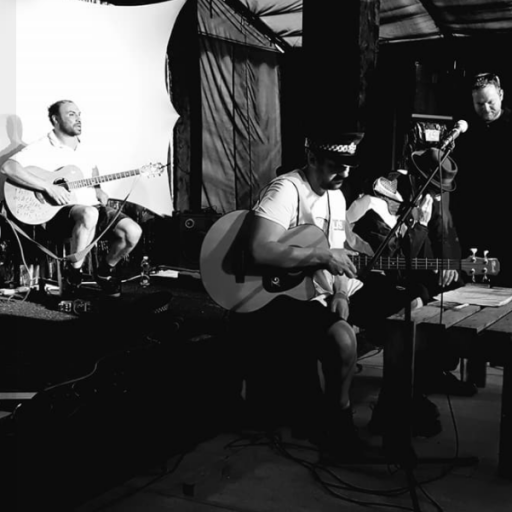Monthly Archives: August 2019
Crocodile Rock

Oran Mor, Glasgow
Aug 26–31 , 2019
Script: ![]() Stagecraft:
Stagecraft: ![]()
It was great to be back at Oran Mor where the year celebrating 500 productions of A Play, A Pie and a Pint launched into its autumn season with Crocodile Rock, a new one-man musical by Andy McGregor. Darren Brownlie plays 17-year old Steven McPhail who introduces himself in song from his makeshift music studio. But this joyous beginning is something of a false start as young Steven found that life at home on the Isle of Millport was tedious, empty and downright boring. The stage was strewn with piles of boxes containing his possessions, giving you the impression of someone who was trying to make decisions about his life and how to live it. By the way, the music in this show was top notch, ably supported by the 2-man backing band of Gary Cameron (keyboard) and Gavin Whitworth (bass and guitar).

As the stories unfold in song, we learned about Steven’s adored mother and rather straight-laced father. We saw him going down to the beach to stare at Millport’s eponymous crocodile rock, which just reminded him of how detached he felt from his surroundings, and how much his soul longed for something different. All his ups and downs were expressed in the music as well as a large cast of imaginary characters. In places the show seemed almost operatic in its production and lyrical quality.
Out of the blue, and to our great delight, along came someone new – a drag queen from a larger world that Steven met by chance and found awe inspiring right from their first encounter. As we watched he seemed like a little boy being led into a new world of wonders he had never dreamed of – a world where at last he felt at home.

But he sang of great heartache as well. Having plucked up the courage to tell him, he loses his father’s approval and finds himself actually disowned. In tears he shouted “I won’t apologize for being who I am”. He had come onstage dressed as a woman, with long blond hair and a tight sequinned pink dress. Now the joke becomes serious, symbol of a great expression of overcoming. With every leap he took us with him, his songs becoming bold, and his world that little bit happier as he realised the true nature of his identity, the real Steven in full frock and make-up. This show was put together to make us laugh and cry, and it did that in spades. It also brought joy out of the heart of despair as we shared the quest to be your real self whatever it may be.
Daniel Donnelly

Vinyl Encore

Script: ![]() Stagecraft:
Stagecraft: ![]()
Performance: ![]() S.O.D:
S.O.D: ![]()
“It’s about feeling alive”. Music is a great many things to different people. For two aging and forgotten rockstars, it’s a chance at redemption, to set their lives back on the right track. Venture Wolf’s third production at the fringe finds the special effect that music has, and runs with the idea, allowing for some pretty strong emotions to surface. But with a confused script that feels more like a clash of ideas than a successful jam session, Vinyl Encore misses that special connection it was aiming for.
One morning, a guitarist for a modern hit-making band, Kieran Kurtz, finds himself in the house of 70’s cult rocker King A. The previous evening, the two had come together on a night out, both trying to chat up a record producer. As the haze of the morning clears, the producer’s promise is revealed – he’ll release a record for both of them, so long as they record it together. Instantly the battle of age and style is clear.
Playing King, AW King is completely believable as a rock star. He is a punk rocker whose lyrics are like psychedelic poetry. Kurtz, played more straight laced by Paul Vitty, is insecure about his talent as a guitarist, keen to play far more than just three chords in a song. The dream to work together is about as madcap as they come, but as the jamming begins the possibility starts to look quite attractive. Competent musicians, at first King’s lyrics don’t quite fit Vitty’s improv guitar, but there is a spark of something. Aping the heavy guitar rock sound of the White Stripes, and highly reminiscent of DIY punk, there’s potential here for excellence with some polish.
The problem with Vinyl Encore’s production is that it promises the two will get over their differences and end up creating something harmonious and unique, but they never do. The music never quite reaches brilliance, and the other elements of the script echo this. Unstructured, the dialogue can feel a little too improvisational sometimes, meaning that the lines crash into each other as much as the characters. Both musicians are clearly going through more personally than just a career slump, but the story beats don’t combine in such a way that the emotion can be felt. It’s not that they are unlikeable characters, in fact, they are quite relatable. It’s just that the convoluted and sometimes absurd nature of the script doesn’t allow for sufficient empathy to build.
An ominous knock at the door propels this production towards its conclusion, with a sense that something more slick could have achieved a far greater effect. Both Vitty and King bring the required emotion to their respective roles, and their passion for music is so clear. But in the end, they don’t quite manage to articulate why the music made them feel so alive.
Daniel Sareen

Vinyl Encore
theSpace @ Surgeons’ Hall
12th-17th August 18:05
19th-24th August 19:05
www.venturewolf.yolasite.com
Hard to be Soft: A Belfast Prayer

Lyceum Theatre, Edinburgh
Edinburgh International Festival
21 August 2019 to 24 August 2019
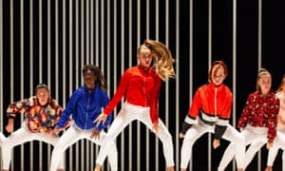 Let’s face it, the bastion of baffling pretention known as ‘Interpretative Dance’ is at the very pinnacle of the pyramid of thespian charlatanary that are the Edinburgh Festivals. Interpretative Dance tackling the, ahem, laugh-a-minute Norn Irish ‘Troubles’ sounds like a ‘Legitimate Target’ or at least a fleg up for a spot of recreational rioting. However, and I can’t believe I’m writing this (I’m as surprised as you), Oona Doherty’s ‘Hard to be Soft: A Belfast Prayer’ is one of the best fifty minutes I have ever spent in a theatre outside of the bar.
Let’s face it, the bastion of baffling pretention known as ‘Interpretative Dance’ is at the very pinnacle of the pyramid of thespian charlatanary that are the Edinburgh Festivals. Interpretative Dance tackling the, ahem, laugh-a-minute Norn Irish ‘Troubles’ sounds like a ‘Legitimate Target’ or at least a fleg up for a spot of recreational rioting. However, and I can’t believe I’m writing this (I’m as surprised as you), Oona Doherty’s ‘Hard to be Soft: A Belfast Prayer’ is one of the best fifty minutes I have ever spent in a theatre outside of the bar.
Full disclosure. I’m from Belfast (and Hard as Fuck). I arrived with a mouth full of sarcasm and a hipflask full of whiskey. I left in a daze, genuinely and deeply impressed by what I was sure was going to be a load a ballax. Gobsmacked by a piece of work which at one level is just punters prancing about on a stage but on another is an eloquent understated yet (gulp) powerful physical drama.

That David Holmes, top-end Soul Techno Gay House DJ producer, soundtracker to Hollywood, proper Belfast Boyo and all round good egg himself provides what is termed the ‘soundscape’ doesn’t hurt. The whine of paranoia and choppers, the unmistakable whirr of the tyres of the armoured cars on the streets, samples of various Spides and Millbags (ask somebody from Belfast), sweeping electronica, the music (soundscape my arse) sets light to some great dancing and a genuinely poetic portrayal of the daftness of the last forty years telescoping from the personal to the political.
A Belfast Prayer doesn’t just avoid cliché, it dingies it altogether. (Love that word)

Nobody gets done, nobody sings about Colleens or dogs or some Boyo on a horse that fucked off years ago because he clocked you were a psycho and fifty texts a day at least. No-one glosses over the barbarity. And praise be to St Michael Alec Joey Van Barry and the lord Georgie Himself nobody bores anyone to death about the alleged politics. Amazing. Just one gripe ‘Soundscape? Really Davy…. Soundscape?… aye dead on mate… yer from East Belfast for fucks sake. Have a wee word eh? Plus it was a bit smoky in there, alright? Up The Hoods!
Irish Adam


Genesis: The Mary Shelley Play

C Cubed
Aug 21-26 (17:05)
Script: ![]() Stagecraft:
Stagecraft: ![]()
Performance: ![]() S.O.D:
S.O.D: ![]()
In my role of reviewer, I always like to take the most objective route possible, to preferably not know anything about the play I am set to see. In the case of ‘Genesis: The Mary Shelley Play,’ however, this would be impossible. Half a lifetime ago, in 1998, I found myself busking in Pisa, composing a poem entitled ‘The Death of Shelley. ‘ This was my turf, & whatever the play did, it had better do it bloody well. The story’s core comes from the creative furnace that was the meeting of poetical minds at the Villa Diodati by Lake Geneva in 1816 – as canonized in English literature as the Shakespearean plays. Following the massive 1815 eruption of Mount Tambora in Indonesia, the year of 1816 had no summer, & thus kept inside by the constant rain our poets & their entourage resorted to telling ghost stories. From it came Frankenstein & also the modern version of Dracula – from Byron via Doctor Poliodori, who was also present at the villa & is in the play. This, by the way, got off to a terrible, terrible start. A cluttered, fairly insane rush to get all the characters on stage, chitter-chattering their back-stories so we all knew what was going on. Far better to have them listening to Coleridge’s Christabel or those German horror novellas which were the true seed-spirations for Frankenstein. They were never mentioned at all, a fatal flaw – but we did get to see Clare Claremont’s naked buttocks.
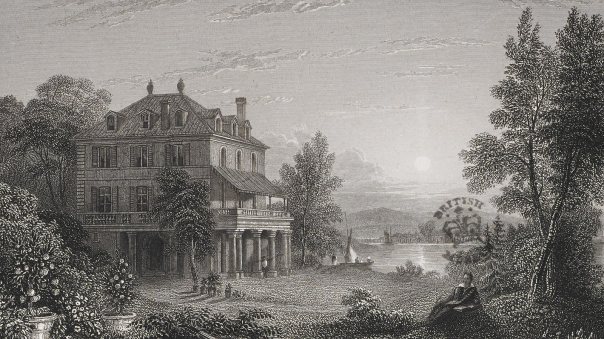
The Villa Diodati – Milton had stayed there with his friend, Charles Diodati, thus it was an obvious choice of residence for Byron & Shelley
Things evolved a little better, I must admit; a series of set-piece scenes which showed our troupe to be fine, fine actors. Where many plays taper into the wind after the start, Genesis actually managed to gather itself together & keep us interested until the end. The Byronic portrait was the best part, I think, & done quite well. The Allegra sub-plot appeared, sprinkling in a little of that scandalous gossip which followed Byron everywhere, while the subtle foreshadowing of Shelley’s Leghorn disaster was a clever touch. But the real damage had been done right at the start, & I found myself lolloping on to the finale in the same way I watch a cartoon film with my kids; out of duty really.
Like I said, the actors were good, pristeen even, but they didn’t look like the avatars they were meant to be playing. The Diodati Summer has become part of our folklore & is recreated very much like the mystery plays of Kerala & Tamil Nadu, where scenes from the Mahabharata are acted out village to village. Imagine the disconcertment of a South Indian audience when they gaze on Vishnu & discover he looks more like Ganesha. There was also very much a lack of any real ‘fear,’ a bit of LSD-hysteria & a couple of Hammer Horror lightning bolts. But of course this play was too busy cramming in far too much biographical detail to worry about entertaining us.
Damian Beeson Bullen

amendments: A Play On Words

This was a totally brilliant show from the beginning to end. From the moment when the two protagonists entered the stage, the pace and intensity never let up for a minute. The “Play about Words” was indeed a play ON words as manager Kenneth and employee John sought to navigate the ever increasing demands of political correctness, overlooked by the large whiteboard behind their desks, covered with motivational slogans and strategies to improve employee performance.
John, it seemed, was in trouble and the hour centered on Kenneth’s efforts to correct him. The room shrank as focus and attention grew on the tussle between two men professionally trained to define what political correctness actually entailed. It was the contrasts that I really enjoyed, the arguments and questions delivered with surprising physicality, given that the set was an office and the weapon of choice words. Kenneth would constantly correct John, pointing out a progression of rules and conditions that must be complied with. John becoming increasingly frustrated until he could take it no more and confronted his boss.
With consistent, sometimes astonishing, performances, this show took us on a comedic rollercoaster ride of a debate covering just about every aspect of political correctness. John was driven to anger by the persistent Kenneth, determined to follow the rules. In the end, he complied with the amendments and received praise from his relentless Correctness officer. But not before the pair of them had made us laugh at the absurdity of it all, and made us change and open up to the ideas coming at us thick and fast.
Daniel Donnelly

amendments: A Play On Words
TheSpaceUK@ Northbridge
Aug 19-24 (21:35)
www.middleweighttheatrecompany.com
Remind Me Again Why I Need A Man
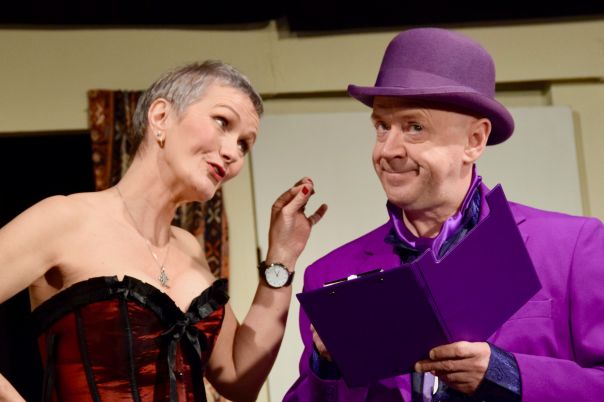
Script: ![]() Stagecraft:
Stagecraft: ![]()
Performance: ![]() S.O.D:
S.O.D: ![]()
As the room turns from dark to light Maggie emerges with a man dog. Complete with leash and black leather whip, Maggie means to please. Played out around a white table with more objects of desire than a Toys R Us store, the first of her clients arrive. As spanking commences, time passes and with tasks left unfulfilled the playful sessions begin. This is not a dominatrix sex dungeon, but in fact a comedy theatre show about the Dos and the Don’ts of everyday life, the Whys and Why Nots? Fantasy or reality, right or wrong, who is to judge ? The man above or the man below? You, me or the woman who deals therapeutic pain through pleasurable means. Remind Me Again Why I Need a Man is here to answer those very questions. From civil servants to highly strung bankers they have all required the services of Maggie and her magic. Then the unthinkable happens.
We both like comedies that have a heart. Something that makes you care for the characters even as you’re laughing at them. We like our characters vulnerable. Read the full interview
With another impatient ring at the door, death”s assistant turns up with his new look. Sporting a purple suit and a born again attitude, he is happy to announce that the fun starts when the heart stops and Maggie’s nearly did. Could love conquer death ? Would you lie to death? Does Amazon exist on the otherside and does Alexa Google have all the answers? Remind Me Again Why I Need A Man has some hidden but yet obvious messages about who we are. Thought-provoking, dramatic, motivating, emotional, bewildering and burgeoning with love and fear, this comedy drama connects all the dots. Relationships are the key to life and this duo have smashed it. Creatively written, honest and open, as time slips through Maggie’s hands and love becomes more of a stranger than a friend, you are left with a only one gnawing question? I hope I don’t have a list that long, or do I?
Raymondo Speedie

Remind Me Again Why I Need A Man
Sweet Novotel
Aug 19-25 (13:00)
www.twofoolish.co.uk
An Interview with Iskandar Sharazuddin
Post Mortem is currently wowing the Edinburgh Fringe
Hello Iskandar, first things first, where are you from and where are you at, geographically speaking?
Hello! I am from the UK. I was brought up in the West Midlands, but also spent parts of my childhood in Australia and New Zealand. I am mixed-race South East Asian – my father is Bruneian-Pakistani. In short, culturally I am a mix of different places and people. I am currently in London.
Can you tell us about your training in theatre?
Sure, I actually trained very specifically in screen acting. My training in theatre was cumulative over years of working on and making plays. My first work in theatre was in Perth, Western Australia where there is a small, tightknit artistic theatre community which is remarkably friendly and forgiving, as well as a place which produces artists that punch far above their weight. It was a safe place to take risks, make new work, and learn the craft. After that I worked on professional commercial theatre productions, where I learnt a lot about the inner workings of theatre organisations from the perspective of an actor. From there, I feel like I am constantly training. My greatest education came from reading and seeing plays – London is a theatre Mecca. I see about three pieces of theatre a week (most of the year round) and read a lot more.

In a world where you can get entertainment ‘on demand’ , what makes theatre special?
Great question. The short answer is I don’t really know, it just feels very special, but that is hard to qualify, isn’t it? The longer answer after a little thinking is that I believe theatre is special because it is a dialogue, or at least I think good theatre should be a dialogue and when I say dialogue, I mean the conversation that exists between artist and audience. When I write a play, I write with the hope that the audience will fill in the gaps. I believe a play only exists as a play when it is put in front of a live and reactive group of people. That dialogue, that relationship, is special and is fundamental. It is also about agency, as an audience member you are free to watch and engage as you wish, whereas with other art forms someone is quite often directing your gaze, does that make sense? Theatre is also special because it is steeped in tradition and history. A history of sharing stories with one another, of using stories and metaphor to talk about injustices, civil rights, pain, joy, and the entire scope of human emotion. And finally, it is also about being vulnerable. We go to the theatre to experience the greatest pains, the deepest fears, the highest hopes, and to be entertained. All of that requires both an audience and an artist to be vulnerable; to share something in the dark that when the lights come up that will leave everyone impacted and thoughtful, and hopefully a little more human.
You are an award-winning playwright, can you give us the low-down on your laurels?
I won the Tony Crazy Playwriting Award in 2014. It was formerly the Soho Theatre Young Writers Award but was recently renamed in honour of Tony Craze, a playwright and novelist who has had a lasting impact on the culture of supporting new writing in Britain. In 2015 I was long-listed for the Bruntwood Playwriting Prize and have previously been nominated and short listed for other awards such as OffWestEnd.com’s Adopt a Playwright and Old Vic 12.

You’re bringing a play to this year’s Edinburgh Fringe; can you tell us about the show & your personal role?
The play is titled Post-Mortem, which by its definition means: an analysis of an event after it has occurred, especially in order to determine why it was a failure. It is a play about young giddy love, the trauma that outlives it, and what happens when we are confronted with the hard truth that perhaps we haven’t moved on. It is the story of Nancy and Alex who met at seventeen, fell in love, the kind of love that is obsessive, whole-hearted, and knotted together, but then it broke. In this play we meet them ten years later at their best friends’ wedding, where they have to confront conflicting narratives about a shared traumatic event in their lives in order to get through the wedding together as the Maid of Honour and Best Man, respectively. I am a playwright-performer. In this piece I am performing as Alex, I have not acted in my own work since 2011, so this feels like foreign territory to me. I am also co-producing this work with my company Ellandar Productions in conjunction with Jessica Rose McVay Productions.
What is it about performing in front of other people that makes you tick?
I enjoy performing and acting in front of an audience, partly because it is nice to know that these people have invested money and time into coming and seeing your work. They are there to listen to you and give you their undivided attention. There is a power to that and there is no denying it feels great, but in the words of Uncle Ben, “with great power comes great responsibility.” I relish having that responsibility as a theatre-maker and as an actor. A responsibility to be sensitive and respectful with the character you’re playing and the emotional journey they are taking, a responsibility to entertain as well as put on stage a human being that is every bit as three-dimensional as a human being sitting in the audience. Lastly, and at the risk of sounding like a cliché, I feel very alive on stage. Being on stage makes me more receptive and perceptive, it helps me to think, listen, and breathe. I am hyper-aware of my surroundings both within the context of the play and within the very real context of the physical space of the theatre.

Your director is Jessica Rose McVay, how is she handling your baby?
With great care and consideration. Jessica is a colleague but also a good friend, we met in 2012 whilst both working on shows in New York and have been talking since then about finding the right piece to collaborate on. Jessica is a woman who approaches the craft of making theatre with zeal and honesty. Jessica has been integral to the development of Post-Mortem. When she came across the play, we, together, took the work, stripped it back and forensically interrogated the piece looking at what it was about, who these characters were, and what the contemporary resonances of the play are. As a playwright-actor I can’t be the “playwright in the room” as I run the risk of being the viewer in the view. As such, I rely heavily on Jessica to note the show and have honest conversations with me about the dramaturgy and narrative, there is a lot of trust involved in our collaboration. Jessica is also a movement director and like me is very interested in the physical language of the play. This iteration of Post-Mortem wouldn’t exist without her input into developing the physicality of the piece. Jessica runs a very democratic rehearsal room and was very generous in providing the right time and space for the work to evolve into what we’re presenting in Edinburgh.

Post-Mortem seems quite a personal play – is there much of your own life experiences in there?
Post-Mortem began life as a different play in 2010 titled The Hill and The Piano. When I look back on the latter play now it is very clear to me that it was a cathartic writing exercise to help me process the end of my first relationship and love. It was overwritten and painfully elegiac. Since 2010 at different intervals I have picked up the piece to redraft, in 2015, I was fascinated with the idea that we, as human beings, have a tendency to mythologise our past and especially events of emotional significance like a formative experience in love, at least that is what I had observed. I was also interested in the malleability of memory and how two people could remember the same event in very different ways, not just emotionally but the actual order of events. I decided to write something new, but started the process by asking the question what is something in my own past that I have a tendency to mythologise, it led me straight to The Hill and The Piano. Hence, Post-Mortem is the product of those thoughts around self-worth and self mythologising, the malleability of memory, and the bones of an old play that was very much material excavated from my personal life. That being said the process of writing Post-Mortem involved deconstructing The Hill and The Piano, and rebuilding it with new foundations. There are echoes of the original play and some theatrical fossils from earlier drafts within the current play, but now it feels a lot further away from me. Alex, doesn’t feel like a representation of me or my experiences but rather a fictional character that has very familiar roots. Likewise the situation in Post-Mortem is a version of events that feel close to a personal experience but exists at a comfortable and necessary distance. I didn’t set out to write autobiographical theatre.
What emotive responses do you expect from the audience?
Empathy. Neither Nancy nor Alex are perfect, in fact they are deeply flawed and in many ways Alex has the tropes of a classical tragic character, specifically a flaw which prevents him from ever being able to fix the situation in front of him. The two characters are embarrassingly human, and I think are deeply relatable as individuals but also as a couple. I expect audiences will be drawn to both Nancy and Alex, at times each one has a conspiratorial moment with the audience where they both feel vulnerable. I think both have been wronged and have wronged the other, in that sense we’re not trying to answer a black and white question about who is right? I expect audiences will be sad at points but leave the theatre with a sense of hope. I would love for audiences to leave and be talking about their first love. Sometimes those experiences can be painful, or overwhelmingly disappointing, or funny, or heart-breaking. I feel we place these relationships on pedestals, or sweep them under rugs, we do our best to forget them, or to glorify them. They are such crucial experiences, integral to our learning, and often can really shape who we become. I think it is important to not mythologise them and remember them as they were, what they taught us, and what we’ve taken from them. Sometimes it is fun to look back, and that is okay, in a world that is constantly looking forward I get lost a lot of the time and have to look back to work out where it is I am going next.
You’ve got 20 seconds to sell your play to somebody in the streets of Edinburgh…
Post-Mortem is a love story that starts with an exploding pig heart, comic books, and Dido. It ends with lies, a lot of pain, and death. Come and get stuck in the middle of it! It has poetry, a lot of puns, the Macarena, and a wedding gone wrong.
Post Mortem
Assembly George Square Studios
5th – 26th August (10:50)
READ THE REVIEW

An Interview with Lizzie Vieh
Monsoon Season is currently smashing the Fringe
The Mumble caught up with its creator
Hello Lizzie, first things first, where are you from & where are you at, geographically speaking?
I am from Phoenix, Arizona, and I currently live in Brooklyn, New York.
When did you first develop a passion for theatre?
In high-school. I needed an art credit and, lo and behold, discovered I liked acting! I was cast as Lysistrata in a production during my sophomore year, and I got to hit boys with a riding crop. I knew I’d found my career.
What for you makes a good piece of theatre?
Don’t be boring, make me laugh, and make me not sure how I feel in parts. I like theatre that doesn’t tell me how to feel and that isn’t necessarily trying to elicit a particular feeling from the audience. I also like creepy stuff.

You’ve got three famous playwrights from history coming round for dinner. Who would they be & what would you cook; starters, mains & dessert?
Caryl Churchill, Maria Irene Fornes, and Sarah Kane. Chips and guac, tacos, then a liquid dessert of tequila cause I’d love to hear what they’d have to say after a margarita or two!
What is the theatre scene like in the New York of 2019?
Tough. It’s tough to hang in there and keep making it when you have to work a day job and the rent is very high. Broadway stuff is a lot of revivals and shows for children, but there’s always good stuff going on downtown and in Brooklyn, if you know where to find it. Theatre people are pretty scrappy, they always find a way.
You’re bringing a play to this year’s Edinburgh Fringe; can you tell us about the show & your personal role?
Monsoon Season is a two-person show consisting of back-to-back monologues. The characters are Danny and Julia, a recently divorced couple living in Phoenix, Arizona. It’s a twisted love story set against the background of addiction, obsession, and violent crime. Also, it’s funny. I’m the playwright!

Therese Plaehn
You originally conceived Monsoon Season as a 40-minute one-man show, why the evolution & how do you think it turned out?
Actually Monsoon Season was originally conceived as a seven minute show for a theatre company called Amios, that produces a monthly evening of six short plays centered around a theme. That month the theme was Halloween. That seven minute version was written in 2015. Then in 2016, I expanded the play to about twenty minutes and performed it at the Samuel French Off Off Broadway Festival. Then in the autumn of 2018 I expanded it to about forty five minutes for a workshop with All For One theater company. That workshop led to a proposal from AFO to develop the play into a full-length. At that point, I felt Danny’s story had become as long as it could – any more material added, and it would lose its cryptic, disjointed feel. At that point, my director Kristin McCarthy Parker came up with the great idea of creating a companion piece where Julia, Danny’s ex-wife, tells her side of the story. And that’s the play we’re bringing here today! I am very pleased with how it’s turned out – it’s been a wild and unpredictable journey. I’ve never spent such a prolonged amount of time working on a show, and I think it has helped me really dig into these characters and get to know them extremely well.
Can you tell us more about Richard Thieriot & Therese Plaehn?
I met Richard through Amios, the theater company that originally produced the seven minute version of Monsoon Season. That’s how the play was born — he was assigned to me as an actor, and I was told to write a short one-man show for him. Although I didn’t know Richard very well at that point, I knew he was a brilliant actor with a lot of charm and comedic chops. I thought it would be fun to work against that charm and inherent likeability – or rather, work into it, but then twist it around into something troubling and dark. Richard is wonderful as Danny and has added so much to the role over the years. It’s really deepened and become extremely specific. Therese, I met quite recently. We had auditions for the role of Julia, and she blew me away. She’s great with language – very smart and precise. She’s able to ride the line between funny and tragic in a disturbing way, that I think is essential for the role. I’m lucky to have two such great actors to work with, who have been game for all the twists and turns this play has taken in the development process.
Monsoon Season seems quite a psychodrama – from which sources have you drawn your inspirations?
On a plot level, I was inspired by my obsession with true crime. I love a good crime narrative, and I’m fascinated by abnormal psychology. As for the emotional dynamics of the play, the inspiration comes from a personal place. I am very moved by stories of people who are trying so hard to reach a goal, but they just keep getting in their own way. Their head is their biggest obstacle. My favorite movie is Sunset Boulevard, and I think there’s bits of Norma Desmond in Julia. When she fails, she fails big, and she fails gloriously.
You’ve got 20 seconds to sell the play to somebody in the streets of Edinburgh…
Come see a twisted, murderous love story that will make you laugh and then make you feel uncomfortable that you laughed!
Monsoon Season
Underbelly, Cowgate – Belly Button
Aug 20-25 (14:20)
READ THE REVIEW

An Interview with Doodle Pop
South Korea’s brilliant Doodle Pop are in Edinburgh
Hello first things first, where are you both from & where are you at, geographically speaking?
Lee Hee-ae: BRUSH Theatre is based in Republic of Korea. To be more specific, our studio is located in Seoul. Even though Seoul is notorious for its business and hecticness, our studio is near by a beautiful forest named after our city. We are all in Seoul now, even though we all come from different regions of Korea. Essentially, we are all contributors for making Seoul the most densely populated city in the World!
Can you tell us about Brush Theatre & your role?
Lee Hee-ae: BRUSH Theatre presents live performances internationally. We are working passionately on ‘Theatre for Young Audiences’. Our main purpose is inspiring young audiences to live their daily life with art and offering quality performances. They have the right to enjoy performances no matter what their socio-economic and geometric backgrounds are. Last year, we brought two shows to the Fringe. The Little Musician was selected as “Three of the Best Shows for Children” by THE SCOTSMAN and Woogie Boogie was selected as “The Best Shows at the Edinburgh Festival 2018” by The Guardian. Woogie Boogie also became a Winner of Asian Arts Award Best Comedy 2018.
Regarding my role, I’m one of two doodlers in Doodle POP. I’m the taller, stronger, and smarter one. My hair style is also much better, ha!
Hello Seunguen, can you tell me where, when & how did you guys get together?
Seungeun Lee: We all met through BRUSH Theatre. It is a theater company that only started in 2015 but was already known for creating really good shows for a young audience. We all joined this company for different reasons. Some are interested in theater for young people. Some are interested in the creative side, and how the company creates a piece. We create our productions by encouraging everyone to participate and share the ideas throughout the whole process instead of depending on all ideas coming from one person. Some are also intrigued by the way this company is being managed. We meet up every morning and then go our own ways in the evening. We work together, cook together and eat together. We are not a family, but it’s different than just being friends and very far from just co-workers – we all have a strong bond. It’s very strange, ‘Brushistic’ relationship.
Last year you performed The Happy Dragon in Turkmenistan, how did you get that gig & how was the experience?
Seungeun Lee: It was one of the best audiences and one of the biggest applauses that we’ve ever had. The Happy Dragon is based on a story written by a Turkemenistan writer. It is about a dragon who spits flowers instead of fire. Even though the young audience was from Turkmenistan and we are from Korea (which are very different cultural backgrounds), we found that a story of a young dragon who brought all the colors of flowers to a desert of Turkmenistan brought us all together.
Doodle Pop is advertised as a Kid’s show, but will adults enjoy the show?
Seungeun Lee: Even though we owe the success of these magical moments of Doodle POP to technology, the show basically comes from creators’ personal desire to create stories, rather than an interest in technology. The most important inspiration for our show were memories from our childhood. We were the kind of kids who had fun while scribbling on a small sketchbook and even on a wall! We remembered how those blank spaces inspired us, and how exciting it was to fill every space with anything we could think of. We wanted to bring back those moments, and that feeling. We didn‘t have to be a master of anything in order to scribble. There is no right or wrong, no good or bad way to doodle. There wasn’t any story to follow, and we didn’t have a specific message to deliver – as children, we always made up our own stories.
You’re bringing a new show to this year’s Edinburgh Fringe; can you tell us more?
Lee Hee-ae: Doodle POP is a multimedia drawing show where doodles come alive by combining hand drawing and projection. It is about two friends, armed with black ink markers, going on their first adventure to the sea with their lovely turtle. As they draw and erase on the big whiteboard, all the inky mysterious sea creatures that appear on and around the board, play pranks on our mischievous duo whilst they draw.
What South Korean folk motifs do you include in Doodle Pop?
Seungeun Lee: Rather than depending on a linear storyline or some characteristics of certain cultural background, Doodle POP is purely driven by the impulse to draw and erase. The flow is quite erratic so no audience can expect what comes next. During the whole procedure, the audience can keep making guesses whilst being captivated at what unfolds. Audiences that we have met are immersed in the whole erratic flow Doodle POP unfolds. (No matter where they are from or what they do). Every capricious stroke metamorphosis into an unexpected feature and children actively respond to it. Young audiences laugh, they yell and they try so hard to guess what comes next. (Actually, their parents do exactly the same thing as well…). Every wild guess is welcomed because the show itself is from creators’ untamed thought.
What is the biggest obstacle you overcame while putting Doodle Pop together?
Lee Hee-ae: Actually, it was the most basic thing that was the biggest obstacle – finding thick nibs for our pens, finding the right material for a big whiteboard wall, and finding a way to erase off enormous amount of ink at once. It was also the most interesting part that required many experiments and our creativity.
Last year you brought Woogie Boogie to the Edinburgh Fringe to widespread acclaim – why do you think the show was so well received?
Seungeun Lee: I think it is because Woogie Boogie brought out the inner child of our audience! Like all of our repertoire, Woogie Boogie encouraged the audience to be actively engaged to the show. The interaction between our performers and audience of last year’s Fringe created a very special atmosphere. During the performance, everyone shared the imaginative energy and harmless laughter of rejoicing, and in turn, experience a shared friendliness from each other. It is an honor, and the biggest pleasure, for creators to see that our own imaginary world means something to our young audience and hopefully even inspires them.
You’ve got 20 seconds to sell the Doodle Pop to somebody in the street…
Lee Hee-ae: Hello, do you love to Doodle? Then come to see our show! Even if you don’t like doodling, come and see our show because you will end up loving it after seeing Doodle POP. Doodling can take us anywhere we want and can bring us everything we want. If you want to see doodles come alive, then be sure to come along! This show is full of fantastic ideas and adorable fantasies.
Doodle Pop
Assembly George Square Studios
Aug 20-25 (10:50)
READ THE REVIEW

Sam Nicoresti: UFO

Heroes @ The SpiegelYurt
Aug 1-25 (23:40)
Script: ![]() Stagecraft:
Stagecraft: ![]()
Performance: ![]() S.O.D:
S.O.D: ![]()
Last year I was completely blown away by Sam Nicoresti & his one-off ‘The Bedtime Funtime Go To Bed Right Now Show,’ an end-of-Fringe comedy special upstairs on the Blundabus. It was completely bonkers & brilliant at the same time, & in the intervening 12 months had often popped into my head at curious times of the day. I was delighted to discover Sam was back in the same precincts this year, performing a piece called UFO in the Spiegelyurt across the walkway from the Bus. Sitting down in the very-mini-circus-tent I was expecting some of the same nutmeg cartoonery from last year, but was instead transported into another dimension completely. UFO was more performance art, more story-telling, than comedy. So here we are, dear reader, in Mumble Theatre, for my instincts tell me this is where this hybrid really belongs.
Sam enters the arena in an orange suit & flashing helmet, 20,000 Leagues Under the Sea style. From here we get a series of champagne-bubbling anecdotes, Georgian soliloquies & the odd borderline rant; all of which end in him dropping to one knee, punching a single hand towards the stars, & revealing the agnostic title of the piece, such as ‘Underage F–able Object.’ A bit like Ian Brown’s song F.E.A.R.. Sam is a proper roulette wheel performer, whose restless physicality sees him spinning & swaggering around foot-to-foot, stilling a few seconds to let his gorgon-gaze fall for a moment on an audience member, before setting off on his cycle once more.
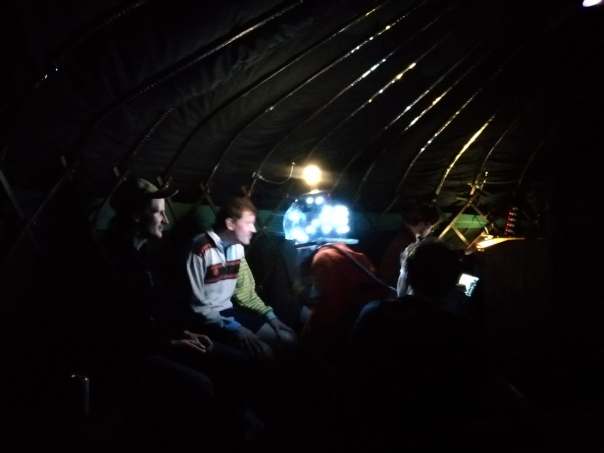

About half-way through his wikipedic, carnival patter through the eight dimensions, the orange suit suddenly reminded me of that analogue-age kids’ past-time called Etch-a-Sketch. What Sam was doing was exactly the same; drawing lines & pretty pictures along his thought-patterns, then wiping them off the surface of our psyches with a shake, a flourish & the aforementioned kneel.
The highlight of UFO was the nihilistic acceptance of a trip to Iceland, calling his psychotic drug-dealer’s bombastic bluff in an act of trustworthiness beyond belief. Luckily he survived the potential body-in-a-bog scenario, allowing us to laud both his sheer bravery & ability to supersoar vocally through its memories. Sam’s mind works faster than most people on the planet, & his mouth just about manages to keep up. I must also mention the way time absolutely flies by; all of a sudden Sam intimated we were approaching the end of the show. I looked at my phone & discovered I’d been sharing his dreamscape for 50 whole minutes, when it had seemed like 15. Amazing time dilation sheering off our trans-dimensional wayfaring!
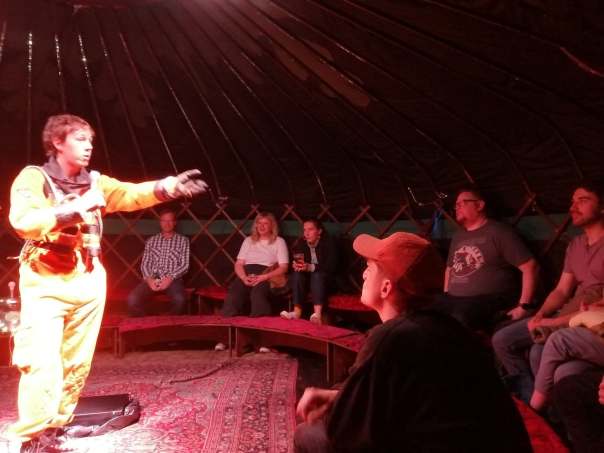
When summing Sam up, I like to think of words like eccentric, rhapsodic, PT Barnum & a just wee bit gaga; but most of all I like to think of him doing his thing like nobody else can. Sam refuses to be typecast & whatever he’s got up his sleeve for next year will only be, well, by Sam Nicoresti.
Damian Beeson Bullen



